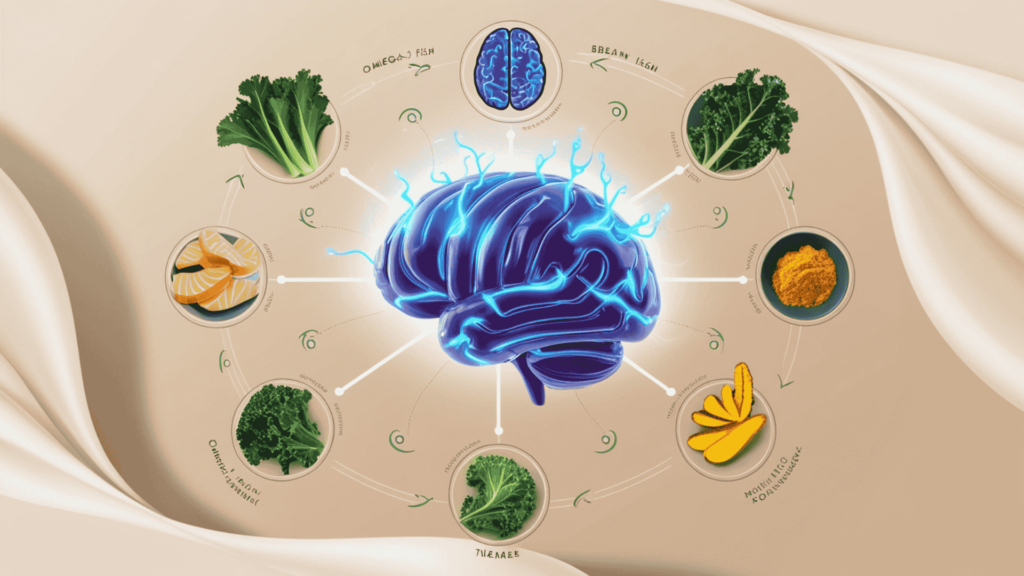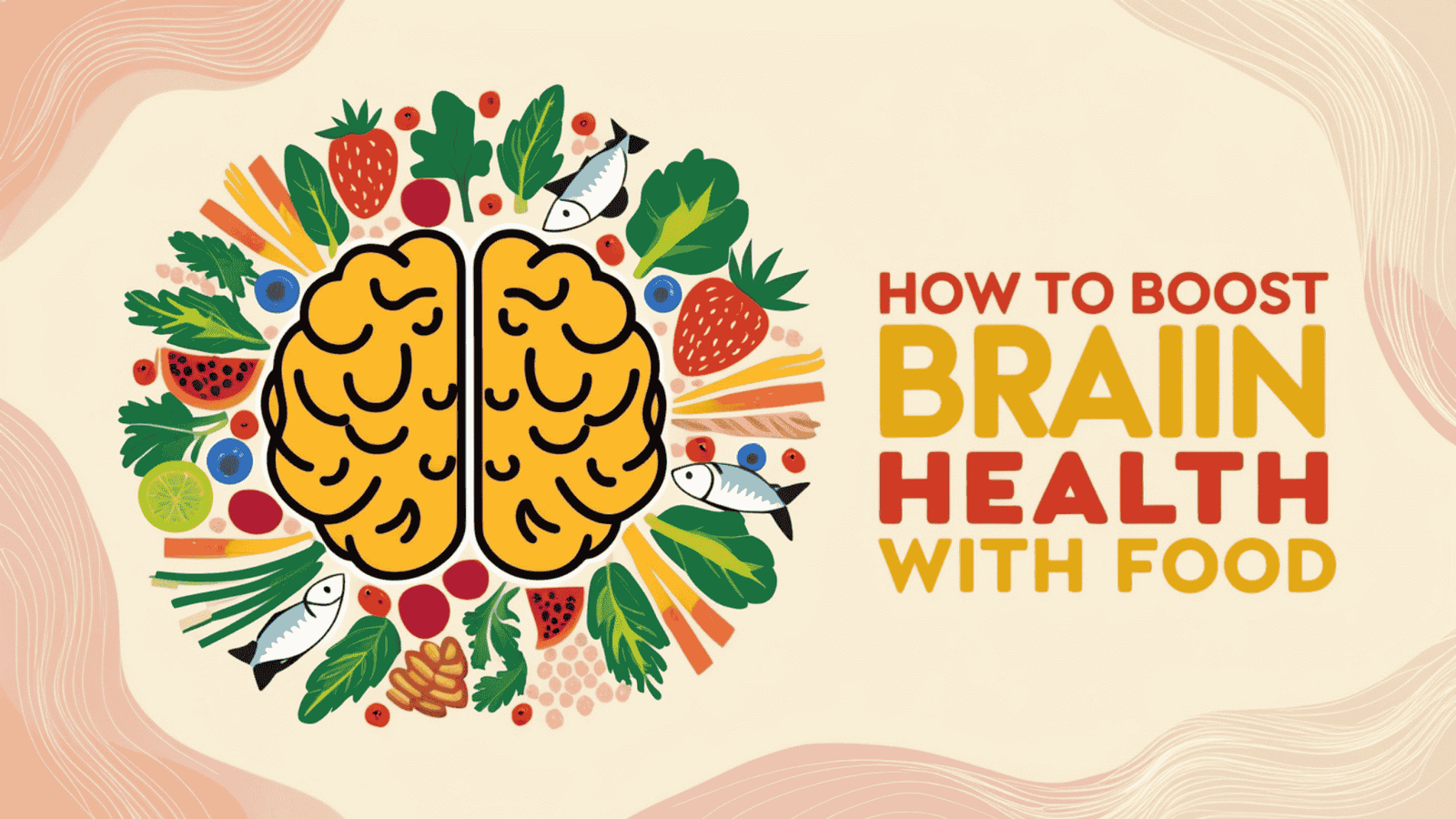Hello, Beautiful People, I am Hassan! Want to attain best brain health? You might be thinking that genetics play role but, let me tell you that diet is a dominant tool in increasing brainpower. Eating up foods that are rich in nutrients can:
- Increase memory
- Improve concentration
- Slow cognitive decline.
This blog post will show the science behind brain-boosting nutrients. We will see the best foods that support brain health. Including the foods into your daily routine can keep your mind active.
Get ready!
Table of Contents

Understanding Brain-Boosting Nutrients
Some nutrients are necessary for keep going and increasing brain health. Some brain-boosting nutrients are:
Fatty Acids for Brain Health
They are essential for building brain cell membranes. They also promote new brain cell shaping. It sources include;
- Fatty fish
- Flaxseeds
- Chia seeds
- Walnuts.
Antioxidants for Brain Health
They protect brain cells from oxidative stress and swelling. Its sources include:
- Berries
- Dark chocolate
- Nuts.
Vitamins for Brain Health
Vitamins help in the manufacturing of neurotransmitters. They also improve mood. Its sources include:
- Whole grains
- Eggs
- Leafy greens
- Legumes.
Minerals for Brain Health
- Magnesium: Its supports brain plasticity. Its sources are: leafy greens, almonds, avocados, dark chocolate.
- Zinc: It is needed for brain development. Its sources are: pumpkin seeds, cashews, chickpeas, red meat.
Amino Acids for Brain Health
- Tryptophan: They make better mood and cognition. Its sources are: turkey, eggs, cheese, nuts.
- Tyrosine: It is involved in motivation and focus. Its sources are: dairy products, soy, beef, fish.
Polyphenols for Brain Health
They make blood flow better to the brain. They also promote cognitive function. Its sources include:
- Tea
- Red wine
- Berries
- Dark chocolate.
Top Foods For Brain Health Boosting
Food | Main Nutrients | Benefits for Brain Health |
Fatty Fish | Omega-3 Fatty Acids |
|
Berries | Antioxidants, Vitamin C |
|
Nuts and Seeds | Vitamin E, Healthy Fats |
|
Leafy Greens | Vitamins (B6, B12, Folate), Magnesium |
|
Whole Grains | B Vitamins |
|
Dark Chocolate | Antioxidants, Flavonoids, Magnesium |
|
Avocados | Healthy Fats, Vitamin K, Folate |
|
Pumpkin Seeds | Zinc, Magnesium, Antioxidants |
|
Eggs | Choline, B Vitamins |
|
Turmeric | Curcumin (antioxidant, anti-inflammatory) |
|
Broccoli | Vitamin K, Antioxidants |
|
Oranges | Vitamin C |
|
Green Tea | L-theanine, Caffeine, Antioxidants |
|
Beetroot | Nitrates |
|
Walnuts | Omega-3 Fatty Acids, Antioxidants |
|
The following video is how food boosts up brain health:
The Science Behind Food and Brain Health
Understanding the link between food and brain function means the mechanisms by which particular nutrients that impact cognitive processes. Following are some findings:
Omega-3 Fatty Acids
Omega-3 fatty acids are main components of brain cell membranes. They support the growth and development of brain tissue. Studies have shown that higher levels of DHA are connected with:
- Improved memory
- Faster information processing
- Reduced risk Alzheimer’s .
Antioxidants
Antioxidants fight with oxidative stress. They neutralize free radicals that can damage brain cells. This supports brain health. Research shows that antioxidants can improve communication.
B Vitamins
B vitamins makes mood better. They include:
- B6
- B12
- Folate
Magnesium
Magnesium is connected with 300 biochemical reactions in the body. Studies shows that magnesium can increase learning. It can reduce brain swelling.
Polyphenols
They are present in green tea and dark chocolate. They protect against neurotoxins. Research shows that polyphenols can increase cognitive function.
Amino Acids
Amino acids play main roles in mood regulation, motivation, and cognitive functions. Studies show that amino acids can increase mood and focus.
Creating a Boosting Meal Plan for Brain Health
A well-balanced meal plan rich in brain-boosting nutrients can increase brain health. Following is a practical guide to create your own meal plan that will boost your brain health:
Breakfast
Option 1: Smoked salmon omelette with spinach and avocado. It provides:
- Fatty acids
- Vitamins
- Minerals.
Option 2: Mixed berry smoothie with Greek yogurt and chia seeds. It increases antioxidants. It provides protein for energy.
Mid-Morning Snack
Handful of walnuts and a piece of dark chocolate.
Lunch
Option 1: Quinoa salad with leafy greens, chickpeas, avocado, and a lemon-tahini dressing. It gives mixture of complex carbohydrates, protein, and healthy fats necessary for brain function.
Option 2: Whole grain wrap with tuna, mixed greens, tomatoes, and hummus.
Afternoon Snack
Sliced apple with almond butter. It gives a balanced snack with:
- Fiber
- Healthy fats
- Protein.
Dinner
Option 1: Baked salmon with quinoa and roasted vegetables.
Option 2: Lentil and spinach curry served with brown rice.
- Ingredients: Lentils (protein and fiber), spinach (vitamins), brown rice (whole grains).
- Benefits: Plant-based protein from lentils and fiber-rich brown rice support brain health and provide sustained energy.
Tips for Boosting Brain Health
- Variety
- Hydration
- Balance

Tips for Optimal Brain Health
You should include habits that will increase your cognitive function and support long-term brain health. Following are some practical tips:
1. Stay Physically Active
2. Get Quality Sleep
3. Manage Stress Effectively
4. Stay Mentally Active
5. Socialize and Maintain Relationships
6. Stay Hydrated and Eat Well
7. Limit Alcohol Consumption and Avoid Smoking
8. Protect Your Head
Including these tips into your daily routine can promote best brain health. It can:
- Increase cognitive function
- Support overall well-being
- Maintain an active mind.
Foods to Avoid
There are some foods that you should not eat if you want to have the best brain health. Following are foods to avoid:
Sugary Foods
High sugar intake can cause crashes in blood sugar levels. Its examples include:
- Soda
- Candy
- Pastries
- Desserts.
Trans Fats
Trans fats can boost LDL cholesterol levels. This cause inflammation to the brain. Its examples include:
- Processed foods
- Fried foods
- Margarine
- Baked goods.
Highly Processed Foods
Foods high in refined carbohydrates and additives can contribute to inflammation. Examples include:
- Fast food
- Instant noodles
- Sugary cereals
- Processed snacks.
Excessive Salt
High sodium input can cause hypertension. It reduces blood flow to the brain. Some examples are:
- Salty snacks
- Processed meats
- Canned soups.
Alcohol
If you consume less alcohol, it may have some health benefits. But, more drinking can lead to brain shrinkage and cognitive decline.
Artificial Sweeteners
Artificial sweeteners may alter gut microbiota and increases the risk of metabolic disorders.
Highly Processed Meats
Processed meats contain high levels of saturated fats that affect brain. Its examples include:
- Bacon
- Sausage
- Hot dogs
- Deli meats.
Limit Caffeine
Excessive intake from energy drinks or high caffeine products may cause anxiety, and disturb sleep patterns.
Smoking
Nicotine can narrow blood vessels. It reduces oxygen flow to the brain.
Low-Quality Fats
Saturated fats can increase cholesterol levels. This affects brain health.
Conclusion
In conclusion, organizing a brain-boosting diet is important for maintaining best brain health. By including foods that are rich in nutrient can support your brain function. It will minimize the risk of cognitive decline.
Combined with regular exercise, quality sleep, stress handling techniques, and social appointment, these practices create a comprehensive viewpoint to increase mental accuracy. Remember, every eating choice takes part to your brain’s flexibility. It makes you strong you to live a mentally healthy life.
So, when are you starting to work on your brain health?
FAQ
- How does diet affect brain health?
A balanced diet affects brain function by providing main nutrients that support:
- Neurotransmitter production
- Reduce inflammation
- Promote optimal blood flow
- Enhance memory and focus.
- Can some foods stop Alzheimer?
There is no single food can stop Alzheimer. But, a diet rich in following can help overcome the cognitive decline:
- Antioxidants
- Omega-3 fatty acids
- Vitamins
- How can I maintain a healthy brain according to my age?
To maintain brain health as your age, you need to have:
- A healthy diet
- Stay physically active
- Get enough sleep
- Manage stress
- Stay mentally engaged.
- What are some quick brain raising snacks?
Quick brain raising snacks include:
- Nuts and seeds
- Yogurt with berries
- Apiece of dark chocolate
- Whole grain crackers with hummus
- Smoothie with spinach
- Fruits rich in antioxidants.
- Is caffeine good for brain health?
Normal caffeine intake can increase alertness for a short time. But, more caffeine consumption should be avoided as they can cause negative effects like:
- Jitteriness
- Disrupted sleep patterns.




